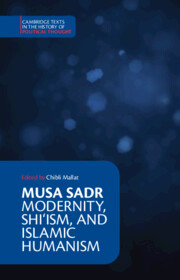Refine listing
Actions for selected content:
1299758 results in Books
The Other Nepal
- Alterity in Nepali Literature and Culture
- Coming soon
-
- Expected online publication date:
- December 2026
- Print publication:
- 31 March 2026
-
- Book
- Export citation

The Cambridge History of Irish Poetry
- Coming soon
-
- Expected online publication date:
- October 2026
- Print publication:
- 31 October 2026
-
- Book
- Export citation
Sergei Eisenstein in the Classical Tradition
- Coming soon
-
- Expected online publication date:
- September 2026
- Print publication:
- 30 September 2026
-
- Book
- Export citation
The Tragedy of Soviet Market Economists
- The Failed Quest to Civilise Russia, 1972–2022
- Coming soon
-
- Expected online publication date:
- August 2026
- Print publication:
- 31 August 2026
-
- Book
- Export citation
A Student's Manual for A First Course in General Relativity, Third Edition
- Coming soon
-
- Expected online publication date:
- August 2026
- Print publication:
- 31 August 2026
-
- Textbook
- Export citation
Sexually Liminal Lives
- Chiyawali Koti Identities in Eastern India
- Coming soon
-
- Expected online publication date:
- August 2026
- Print publication:
- 01 May 2027
-
- Book
- Export citation
Fetal and Neonatal Brain Injury
- Coming soon
-
- Expected online publication date:
- August 2026
- Print publication:
- 31 August 2026
-
- Book
- Export citation

Introduction to Conservation Genetics and Genomics
- Coming soon
-
- Expected online publication date:
- August 2026
- Print publication:
- 31 August 2026
-
- Textbook
- Export citation
The Social Underpinnings of Political Discontent in Latin America
- Coming soon
-
- Expected online publication date:
- August 2026
- Print publication:
- 31 August 2026
-
- Book
- Export citation
The Cambridge Companion to Romanticism and World Literature
- Coming soon
-
- Expected online publication date:
- August 2026
- Print publication:
- 31 August 2026
-
- Book
- Export citation
The Cambridge Introduction to Sumerian
- Coming soon
-
- Expected online publication date:
- August 2026
- Print publication:
- 31 August 2026
-
- Textbook
- Export citation

Marvell and Milton
- Poets in a Fallen World
- Coming soon
-
- Expected online publication date:
- August 2026
- Print publication:
- 31 August 2026
-
- Book
- Export citation

Musa Sadr: Modernity, Shi‘ism, and Islamic Humanism
- Coming soon
-
- Expected online publication date:
- August 2026
- Print publication:
- 31 August 2026
-
- Book
- Export citation
Lexicons of English Religion, 1380–1850
- Coming soon
-
- Expected online publication date:
- August 2026
- Print publication:
- 31 August 2026
-
- Book
- Export citation
Worldwide Perspectives on English Usage
- Into the Third Millennium
- Coming soon
-
- Expected online publication date:
- July 2026
- Print publication:
- 01 May 2027
-
- Book
- Export citation
Embers of Reason
- The Secular Imagination and the Contemporary Indian Documentary
- Coming soon
-
- Expected online publication date:
- July 2026
- Print publication:
- 01 May 2027
-
- Book
- Export citation
The Liar Paradox
- Coming soon
-
- Expected online publication date:
- July 2026
- Print publication:
- 31 July 2026
-
- Book
- Export citation
Why the Arts Matter
- How Art Shapes Our Thinking, Identity, and Wellbeing
- Coming soon
-
- Expected online publication date:
- July 2026
- Print publication:
- 01 May 2027
-
- Book
- Export citation
Game-Theoretic Models of International Crisis Bargaining
- Coming soon
-
- Expected online publication date:
- July 2026
- Print publication:
- 31 July 2026
-
- Book
- Export citation
Technology and Language Learning
- Coming soon
-
- Expected online publication date:
- July 2026
- Print publication:
- 31 July 2026
-
- Book
- Export citation
